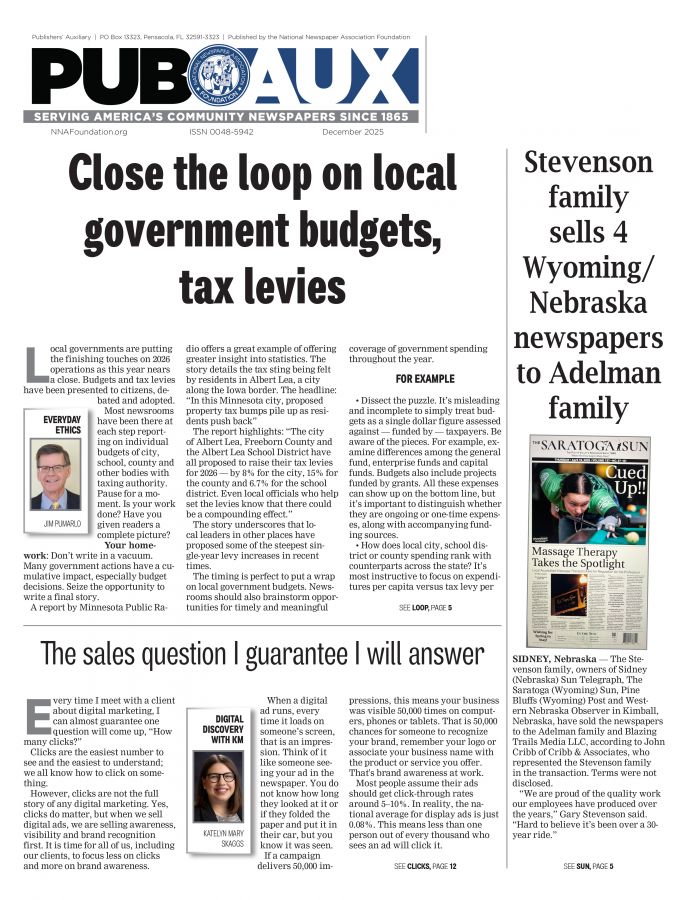NNA members bring their concerns to Congress
Apr 11, 2014
WASHINGTON—National Newspaper Association members converged on Capitol Hill March 13 carrying two main messages: don’t deregulate the U.S. Postal Service and don’t blow up local economies by taxing advertising.
Delegations of publishers were briefed on the status of postal reform, focusing primarily upon S. 1486, which is poised for consideration on the Senate floor.
Jim Davidson, director of The Advertising Coalition and an attorney with the law and lobbying firm Polsinelli, said all media are facing “the most serious threat to the deduction of advertising costs that I have seen in my whole career, and I’ve been doing this a long time.”
The threat, he said, is from the overhaul of the tax code, which is being driven by 42 multinational corporations that want to move their profits to the U.S. without paying taxes on those profits. He estimates that would amount to about $3 trillion.
“In order to do this,” he said, “other people are going to have to pay the costs. And I can’t tell you how many industries are going to be affected by these tax reform proposals.”
Tax reform will cost $169 billion, Davidson added, and it will come out of your pockets, every advertisers’ pockets and every national advertisers’ pocket.
Publishers concluded their day on Capitol Hill with dinner at the National Press Club to hear CBS TV correspondent Bob Schieffer. When addressing the eight collegiate journalists in attendance with the NNA Foundation News Fellows program, Schieffer said, “Journalism is a great way to spend a life.” He urged the young journalists to stick with their craft.
The NNA Foundation News Fellows program is supported by the Ethics and Excellence in Journalism Foundation in Oklahoma City, OK.
On Capitol Hill, publishers told members of Congress that NNA opposes the proposed Senate bill in its present form. It would weaken the Postal Regulatory Commission’s oversight of postage rates and service and set the USPS Board of Governors, a part-time politically-appointed group, as the primary arbiter. In 2017, when the current scheme of an inflation-indexed price cap is due for overhaul, the bill would put the governors, rather than the regulators, in the drivers’ seat.
NNA President Robert M. Williams Jr., said his visit with Senate Majority Leader Dick Durbin, D-IL, led by Illinois Press Association Executive Director Dennis DeRossett and NNA member John Galer, left him with the view that action on postal reform may not happen this year. But, he said, the Postal Service and the mailing industry need a new law that gives the postal agency some financial relief from required federal payments, though not one that goes as far into deregulation as S. 1486.
“We impressed upon him our belief that the Postal Service is primarily a government agency with a monopoly over the mailbox and over most mail. We do not believe monopolies set up by law can be permitted to exercise their power in the marketplace without restraint. Certainly our recent experience with the special discounts granted to the direct mail company, Valassis Inc., and the 6.9 percent postage increase in January have not inspired confidence. Well-functioning markets need rules and monopolies need oversight,” Williams said. “Until the Senate bill recognizes that, we cannot support it.”
The surprise addition of a proposed change in recognition of advertising expenditures in House Ways and Means Committee Chairman David Camp’s draft of sweeping tax reform also energized publishers to educate their members of Congress.
Davidson told publishers that the proposed advertising tax was a part of the Camp proposal, which would make companies amortize half of their advertising expenses each year, spreading the deduction of that half over a 10-year period.
He added that this idea was hatched by people who have never sold advertising.
“Economic theory is not on their side.
“This bill would be an accountants’ boon and a local retailer’s nightmare,” NNA Government Relations Chair Deb McCaslin, publisher of the Custer County Chief in Broken Bow, NE, said. “It would immediately choke off advertising, which would reduce sales, decimate the state and local sales tax and generally slow local economies. I cannot think of a worse place to look for new revenues to offset tax breaks for multinational giants.”
McCaslin said publishers learned on Capitol Hill that action on tax reform is unlikely this year.
But Davidson warned that once proposals take root, they wind up in future versions of major bills.
“The time to kill this bad idea is now,” he said.






